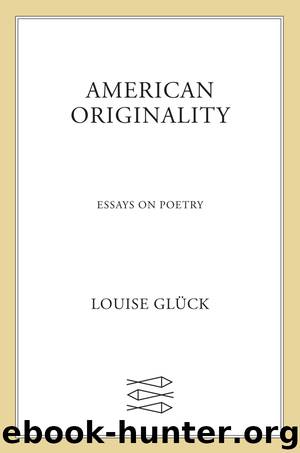American Originality by Louise Glück

Author:Louise Glück
Language: eng
Format: epub
Publisher: Farrar, Straus and Giroux
… This is where the evening
splits in half, Henry, love or death. Grab an end, pull hard,
and make a wish.
—“WISHBONE”
Some of these have a plangency and luster we haven’t expected:
Every story has its chapter in the desert, the long slide from kingdom
to kingdom through the wilderness,
where you learn things, where you’re left to your own devices.
—“DRIVING, NOT WASHING”
Inevitability and closure haunt these poems; the deferred, the fated—impending loss and deserved punishment—suffuse every line. The poems draw a feverish energy from what they don’t really believe: even as the speaker lives his strategies, he doesn’t believe in his own escape. Not every poem operates this way. Siken occasionally locates a poem in loss as enacted, not implicit, event. These are among his most beautiful poems, their capitulations heartbreaking in the context of prolonged animal struggle against acknowledgment. One begins the book, positioning the reader as complicitous:
Tell me about the dream where we pull the bodies out of the lake
and dress them in warm clothes again.
How it was late, and no one could sleep, the horses running
until they forget that they are horses.
It’s not like a tree where the roots have to end somewhere,
it’s more like a song on a policeman’s radio,
how we rolled up the carpet so we could dance, and the days
were bright red, and every time we kissed there was another apple
to slice into pieces.
Look at the light through the windowpane. That means it’s noon, that means
we’re inconsolable.
Tell me how all this, and love too, will ruin us.
These, our bodies, possessed by light.
Tell me we’ll never get used to it.
—“SCHEHERAZADE”
Tell me, the poet says, the lie I need to feel safe, and tell me in your own voice, so I believe you. One more tale to stay alive.
It is difficult, given the length of Siken’s characteristic poems, to convey in an introduction a sense of their cumulative, driving, apocalyptic power, their purgatorial recklessness. In other ways, this introduction has been difficult; because of the poems’ interconnectedness, the temptation has been to quote everything. Such difficulty is, in itself, praise of the work.
We live in a period of great polarities: in art, in public policy, in morality. In poetry, art seems, at one extreme, rhymed good manners, and at the other, chaos. The great task has been to infuse clarity with the passionate ferment of the inchoate, the chaotic.
Siken takes to heart this exhortation. Crush is the best example I can presently give of profound wildness that is also completely intelligible. By Higginson’s report, Emily Dickinson famously remarked, “If I read a book and it makes my whole body so cold no fire can warm me, I know that it is poetry. If I feel physically as if the top of my head were taken off, I know that it is poetry. These are the only ways I know it. Is there any other way?”
She should, in that remark, have shamed forever the facile, the decorative, the easily consoling, the tame. She names, after all, responses that suggest violent transformation, the overturning of complacency by peril.
Download
This site does not store any files on its server. We only index and link to content provided by other sites. Please contact the content providers to delete copyright contents if any and email us, we'll remove relevant links or contents immediately.
The Rules Do Not Apply by Ariel Levy(4969)
Bluets by Maggie Nelson(4556)
Too Much and Not the Mood by Durga Chew-Bose(4348)
Pre-Suasion: A Revolutionary Way to Influence and Persuade by Robert Cialdini(4232)
The Motorcycle Diaries by Ernesto Che Guevara(4098)
Walking by Henry David Thoreau(3962)
Schaum's Quick Guide to Writing Great Short Stories by Margaret Lucke(3381)
The Daily Stoic by Holiday Ryan & Hanselman Stephen(3321)
What If This Were Enough? by Heather Havrilesky(3311)
The Day I Stopped Drinking Milk by Sudha Murty(3197)
The Social Psychology of Inequality by Unknown(3031)
Why I Write by George Orwell(2953)
Letters From a Stoic by Seneca(2798)
A Short History of Nearly Everything by Bryson Bill(2698)
A Burst of Light by Audre Lorde(2607)
Insomniac City by Bill Hayes(2558)
Feel Free by Zadie Smith(2480)
Upstream by Mary Oliver(2390)
Miami by Joan Didion(2368)
